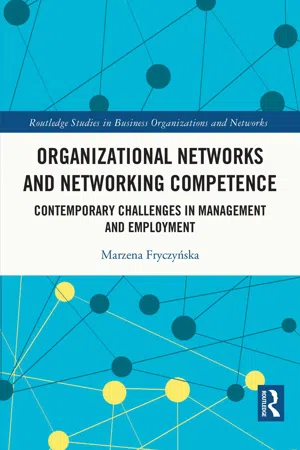
Organizational Networks and Networking Competence
Contemporary Challenges in Management and Employment
- 264 pages
- English
- ePUB (mobile friendly)
- Available on iOS & Android
Organizational Networks and Networking Competence
Contemporary Challenges in Management and Employment
About This Book
Networks and networking are essential concepts that transform organizational, economic, and social practices. Human capital is both a source of competitive advantage and a value that allows individual employees to develop their careers and find satisfaction in their employment. The book addresses the vital issue of changes occurring in management and employment, with the growing career individualization, focus on future professional challenges, importance of knowledge workers, and possibilities of functioning in social and organizational networks.
Workers' networking competence is the main theme of this book. Much attention is put on differentiating it from other types of competence and other network objects, and identifying its behavioral manifestations, as the frequency of such behaviors can be used as a measure of an individual's networking competence level. Employment-related variables and characteristics that affect networking competence are analyzed in depth, as is the impact of networking competence on career success and employability — thus laying a foundation for transformation in network organization management, employee relations, and individual career development.
It will be of interest to researchers and students alike, as it clearly demonstrates a way to solve research problems in management science and provides new instruments for further research on networks and networking; and to organization managers and employees, as it offers insights into management and employment-related trends as well as guidelines for managing network organizations and building one's career within social and organizational networks.
Frequently asked questions
1 Networking in Organizational Management
1.1Sources of Research on Networking in Management
Table of contents
- Cover
- Half Title
- Series Page
- Title Page
- Copyright Page
- Dedication
- Table of Contents
- List of Tables
- List of Figures
- Acknowledgements
- Introduction
- Chapter 1: Networking in Organizational Management
- Chapter 2: From Networking to Workers’ Networking Competence
- Chapter 3: From Career Success to Employability
- Chapter 4: Role of Networking Competence in Achieving Career Success and Employability by Knowledge Workers
- Chapter 5: Methodology of the Author’s Empirical Study
- Chapter 6: Networking Competence and Its Interdependencies: Own Study Results
- Conclusion
- Appendix 1
- Appendix 2
- Appendix 3
- Index